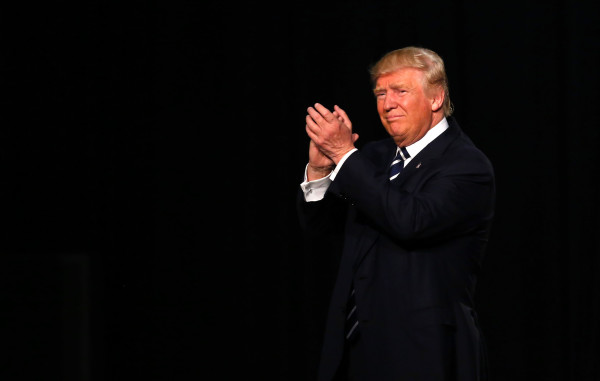
Article 2 / 4
One year of Trump: A guide to investing in the USHas politics had any impact on investments?

The 45th President of the US is not known for modesty, so Donald Trump would, in all likelihood, be the first to suggest his presidency is the reason the US equity market has soared to new highs and why the US economy is so buoyant.
But his critics – of which there are many – would point to the fact Mr Trump has not managed to pass much in the way of legislation since his inauguration on 20 January 2017, and that markets tend to operate outside the President’s influence.
As if to demonstrate this, political uncertainty dominated news flow last year, yet equity markets appeared to ignore the noise and continue rising.
Ryan Paterson, research analyst at Thesis Asset Management, suggests: “We must be careful not to give too much credit to Mr Trump when it comes to his influence in the markets, as very little of his economic agenda has yet to get through Congress.
“While investors celebrated the pro-business parts of his agenda, such as tax reform, deregulation and infrastructure spending, the stockmarket has been carried higher by strong corporate profits and a healthy economy both at home and abroad.”
Legislative battles
During the presidential campaign trail, Mr Trump promised much in the way of reform.
Mark Sherlock, portfolio manager of the US SMID (Small and Mid) Cap fund at Hermes Investment Management, recalls when Mr Trump came into power at the start of 2017, the president had four main economic agenda items.
“The first was a reduction in corporate taxation, the second was a reduction in taxation on repatriated cash that was held overseas, the third was to do with deregulation and the fourth was to do with infrastructure investment,” he lists.
He suggests that in the fourth quarter of 2016 there was an overly optimistic sentiment in the market that all of these would be “quickly won battles and the reality is it takes a lot longer”.
Perhaps in the knowledge a legislative win would not come easily, in the early days of his presidency, Mr Trump’s focus was on issuing a raft of executive orders, setting the tone for his tenure in the White House.
Dan Kemp, chief investment officer, EMEA at Morningstar, notes the wave of executive orders signed by Mr Trump impacted on everything from immigration to trade.
“The number and scope of executive orders triggered (17 in January alone and over 50 in total) has firmly put to rest any hope he would back away from his more extreme campaign pledges. A cynical outsider might say Mr Trump has tackled his first year as president like a seven-year-old would a marathon.
“Whatever your opinion of his first year in office, Mr Trump is clearly a man on a mission.”
“Therefore, with such a newsworthy approach, it is little surprise that politics has meaningfully impacted sentiment,” he acknowledges. “However, we firmly believe it is imperative to look through this noise and realise that politics rarely has a significant impact on the fundamentals.”
Mr Kemp says this means that prices may divert away from fair values in the shorter term based on sentimental shifts, but will inevitably feel the gravitational force of its fundamental baseline.
Tax victory
Indeed, any impact on the markets from Mr Trump’s political stance has so far been short lived, as with the tax reforms which he passed through in December.
Many critics and commentators predicted it would be a year before the president would be able to agree any meaningful legislation. Yet, at the end of 2017 he managed to claim his first legislative victory.
Mr Sherlock believes the tax overhaul was pushed through quickly, bearing in mind the US mid-term elections are due in November 2018.
“The Republicans do need to be able to go back with some sort of feather in their cap to show they’ve achieved something and I think there’s a political will to make that happen,” he concedes.
David Coombs, lead manager of the Rathbone Multi-Asset Portfolios fund, suggests more generally, Mr Trump has had almost zero impact on investments, with the exception of when the tax plan was agreed by the Senate on 2 December.
“And this plan is a shadow of the sweeping overhaul that was originally touted on the campaign trail,” he remarks.
He notes that past short-term moves in share markets based on Mr Trump’s rhetoric all quickly reversed.
“It needs to be kept in proportion: any Republican that won the 2016 election would probably have pushed for tax cuts of this kind following the two Democratic terms. However, another Republican president may not have arrived with so much baggage,” he points out.
“The numerous investigations of the [Donald] Trump campaign and transition team’s improper contact with foreign powers continues to roll on, increasing the risk of impeachment.”
It is this baggage which means investors do not know quite what to make of the Trump administration and could be why they have decided the best approach is not to be distracted by his tweets and war of words with North Korea but to carry on investing as normal.
In the first feature in this guide, research from Seven Investment Management (7IM) confirmed that while the US flagship S&P 500 index had a good run since the president’s inauguration until the end of 2017, the same index performed better during both Barack Obama and Bill Clinton’s first years in office respectively (see table below).
Figure 1: The performance of the S&P 500 index under US presidents

Source: Seven Investment Management
Ritu Vohora, equity investment director at M&G Investments, observes under his presidency, financials has been one of the best performing sectors, in part due to rising interest rates, but the sector has also been boosted by the expectation of some financial deregulation.
John Bailer, portfolio manager at The Boston Company Asset Management, explains: "Any moves on regulation are likely to have a particular impact on banking, a sector where we believe the fundamentals look positive.
"Banks are well-capitalised and the conservative mindset since the global financial crisis means their loan books are better than they have been for many years. With their balance sheets in such good shape, banks have been able to return more of their capital to shareholders."
He asserts: "Banks are already some of the most attractive dividend payers in the US, and lighter regulations would allow them to return even more capital to shareholders as dividends or stock buybacks."
But according to Ms Vohora: “The biggest impact [of Donald Trump's presidency] appears to have been on tax heavy stocks.
“Heavily taxed companies significantly outperformed the less taxed part of the market from the election date (November 2016) to March [2017], reflecting confidence in planned tax reforms. From March onwards though, when tax reforms appeared less likely, heavily taxed companies underperformed until [Mr] Trump recently managed to pass his reform bill in the Senate.”
What does Mr Trump have to do if he wants to exert his influence on US stockmarkets?
Tough ask
Justin Urquhart Stewart, head of corporate development at 7IM, believes it’s debatable how much influence any president has on markets.
“If he delivered 19.97 per cent throughout every year of his term in office he would easily beat all his recent predecessors, but that’s a tough ask for anyone,” he admits.
“The bull market is now approaching its 10th year. The global economy continues to recover and [Mr] Trump’s tax reforms have been well received by markets, but only the most optimistic person would imagine that the strong growth posted in [Mr] Trump’s first year is sustainable.”
eleanor.duncan@ft.com




